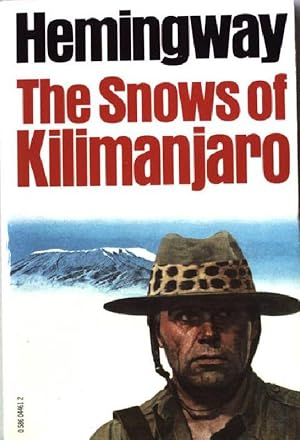Ernest Hemingway, The Snows of Kilimanjaro (Panther: London, 1977)
I think I finished reading The Snows of Kilimanjaro last night. It's hard to be sure. The version I have is a very battered mass-market paperback which I bought in Shepparton for a dollar a year ago.
 |
| Image from here |
However, when I look at the Wikipedia entry for the book, I see that it's meant to include the following stories -
- "The Snows of Kilimanjaro"
- "A Clean, Well-Lighted Place"
- "A Day's Wait"
- "The Gambler, the Nun, and the Radio"
- "Fathers and Sons"
- "In Another Country"
- "The Killers"
- "A Way You'll Never Be"
- "Fifty Grand"
- "The Short Happy Life of Francis Macomber"
None of these save the first appear in the book I have. The collection itself is fairly oddly constructed. Each story begins with a small italicised paragraph describing a scene unrelated to the story itself. "Indian camp", describing a young man called Nick helping his doctor father is prefaced by a description of an army marching towards Mons in World War One. "The Battler", describing the same Nick's encounter with a violent hobo, is prefaced by a description of an execution. I have no idea whether this combination of story and preface is Hemingway's or the editor's. The same Nick appears in a little over half of the stories. From time to time one has the impression that all of the stories will somehow be tied together (nope), or that many of them are jottings from a writer's notebook.
So much for the structural issues. Beyond these, the stories are vintage Hemingway: each is written in that prose which I can only describe as "glassy": hard, close and unsparing. The cruelty in "On the Quai at Smyrna" is described with the plainness of a person for whom pain and cruelty have are facts and not shocks. The weariness and disappointment in "Out of Season" doesn't succumb to self pity.
As I read these short stories-cum-excerpts I found myself more and more impressed by how unsparing they were. I think this quality is more needed in literature now than ever. There is an argument that fiction has changed in our time. Something like 80% of fiction readers are women. The irreproachably progressive National Public Radio observes that -
Theories attempting to explain the "fiction gap" abound. Cognitive psychologists have found that women are more empathetic than men, and possess a greater emotional range—traits that make fiction more appealing to them.This may explain why Jamie Fewery's question "how many books that are published these days speak to the modern male experience of life? How many address the issues around what it is to be a man today, and a young man in particular, with all the attendant crises that come with manhood?" is followed by a description of feelings heavy fluff.
Some experts see the genesis of the "fiction gap" in early childhood. At a young age, girls can sit still for much longer periods of time than boys, says Louann Brizendine, author of The Female Brain.
"Girls have an easier time with reading or written work, and it's not a stretch to extrapolate [that] to adult life," Brizendine says. Indeed, adult women talk more in social settings and use more words than men, she says.
Another theory focuses on "mirror neurons." Located behind the eyebrows, these neurons are activated both when we initiate actions and when we watch those same actions in others. Mirror neurons explain why we recoil when seeing others in pain, or salivate when we see other people eating a gourmet meal. Neuroscientists believe that mirror neurons hold the biological key to empathy.
The research is still in its early stages, but some studies have found that women have more sensitive mirror neurons than men. That might explain why women are drawn to works of fiction, which by definition require the reader to empathize with characters.
"Reading requires incredible patience, and the ability to 'feel into' the characters. That is something women are both more interested in and also better at than men," says Brizendine.
None of this would be worth talking about, if the ramifications were confined to the business models of writers and publishers. But in a world which becomes more brutal in very real ways, I wonder whether saturating the culture with the tenderness of feelings is desirable. That is, is the dispensation from rules that allows a film to celebrate I'm-ok-you're-ok-and-it-feels-good bestiality the same sort of dispensation that allows a common soldier to consider himself relieved from complying with the rules of war? I suspect it may be. Culture is influential (or infectious) that way.
So despite its flaws, is Snows of Kilimanjaro a book I recommend? Yes. Perhaps more than ever the world needs people to look at the world and see its surface with the same obstinate realism on display here.
No comments:
Post a Comment